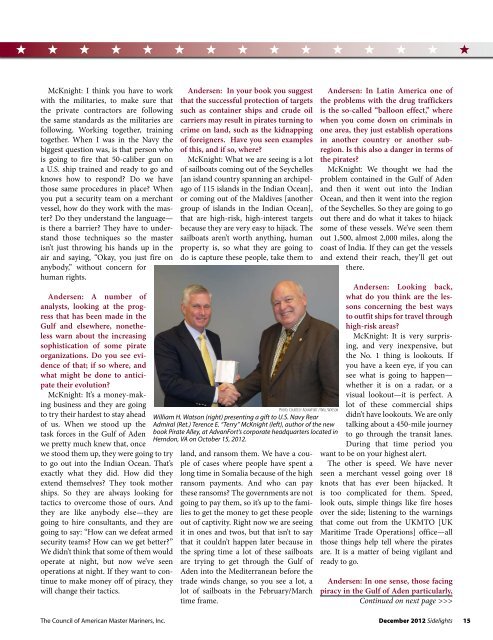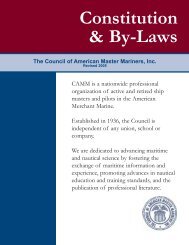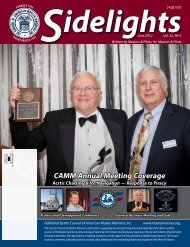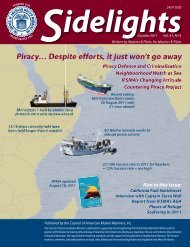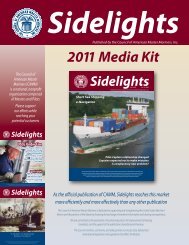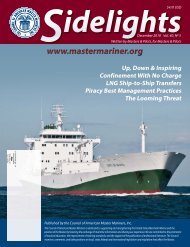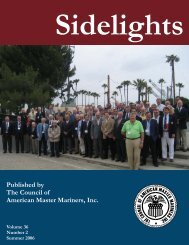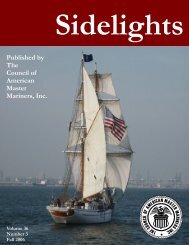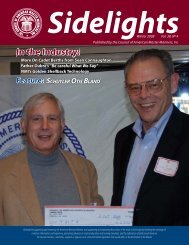Membership In the - Council of American Master Mariners
Membership In the - Council of American Master Mariners
Membership In the - Council of American Master Mariners
Create successful ePaper yourself
Turn your PDF publications into a flip-book with our unique Google optimized e-Paper software.
McKnight: I think you have to work<br />
with <strong>the</strong> militaries, to make sure that<br />
<strong>the</strong> private contractors are following<br />
<strong>the</strong> same standards as <strong>the</strong> militaries are<br />
following. Working toge<strong>the</strong>r, training<br />
toge<strong>the</strong>r. When I was in <strong>the</strong> Navy <strong>the</strong><br />
biggest question was, is that person who<br />
is going to fire that 50-caliber gun on<br />
a U.S. ship trained and ready to go and<br />
knows how to respond? Do we have<br />
those same procedures in place? When<br />
you put a security team on a merchant<br />
vessel, how do <strong>the</strong>y work with <strong>the</strong> master?<br />
Do <strong>the</strong>y understand <strong>the</strong> language—<br />
is <strong>the</strong>re a barrier? They have to understand<br />
those techniques so <strong>the</strong> master<br />
isn’t just throwing his hands up in <strong>the</strong><br />
air and saying, “Okay, you just fire on<br />
anybody,” without concern for<br />
human rights.<br />
Andersen: A number <strong>of</strong><br />
analysts, looking at <strong>the</strong> progress<br />
that has been made in <strong>the</strong><br />
Gulf and elsewhere, none<strong>the</strong>less<br />
warn about <strong>the</strong> increasing<br />
sophistication <strong>of</strong> some pirate<br />
organizations. Do you see evidence<br />
<strong>of</strong> that; if so where, and<br />
what might be done to anticipate<br />
<strong>the</strong>ir evolution?<br />
McKnight: It’s a money-making<br />
business and <strong>the</strong>y are going<br />
to try <strong>the</strong>ir hardest to stay ahead<br />
<strong>of</strong> us. When we stood up <strong>the</strong><br />
task forces in <strong>the</strong> Gulf <strong>of</strong> Aden<br />
we pretty much knew that, once<br />
we stood <strong>the</strong>m up, <strong>the</strong>y were going to try<br />
to go out into <strong>the</strong> <strong>In</strong>dian Ocean. That’s<br />
exactly what <strong>the</strong>y did. How did <strong>the</strong>y<br />
extend <strong>the</strong>mselves? They took mo<strong>the</strong>r<br />
ships. So <strong>the</strong>y are always looking for<br />
tactics to overcome those <strong>of</strong> ours. And<br />
<strong>the</strong>y are like anybody else—<strong>the</strong>y are<br />
going to hire consultants, and <strong>the</strong>y are<br />
going to say: “How can we defeat armed<br />
security teams? How can we get better?”<br />
We didn’t think that some <strong>of</strong> <strong>the</strong>m would<br />
operate at night, but now we’ve seen<br />
operations at night. If <strong>the</strong>y want to continue<br />
to make money <strong>of</strong>f <strong>of</strong> piracy, <strong>the</strong>y<br />
will change <strong>the</strong>ir tactics.<br />
Andersen: <strong>In</strong> your book you suggest<br />
that <strong>the</strong> successful protection <strong>of</strong> targets<br />
such as container ships and crude oil<br />
carriers may result in pirates turning to<br />
crime on land, such as <strong>the</strong> kidnapping<br />
<strong>of</strong> foreigners. Have you seen examples<br />
<strong>of</strong> this, and if so, where?<br />
McKnight: What we are seeing is a lot<br />
<strong>of</strong> sailboats coming out <strong>of</strong> <strong>the</strong> Seychelles<br />
[an island country spanning an archipelago<br />
<strong>of</strong> 115 islands in <strong>the</strong> <strong>In</strong>dian Ocean],<br />
or coming out <strong>of</strong> <strong>the</strong> Maldives [ano<strong>the</strong>r<br />
group <strong>of</strong> islands in <strong>the</strong> <strong>In</strong>dian Ocean],<br />
that are high-risk, high-interest targets<br />
because <strong>the</strong>y are very easy to hijack. The<br />
sailboats aren’t worth anything, human<br />
property is, so what <strong>the</strong>y are going to<br />
do is capture <strong>the</strong>se people, take <strong>the</strong>m to<br />
Photo: courtesy aDvanfort / Will Watson<br />
William H. Watson (right) presenting a gift to U.S. Navy Rear<br />
Admiral (Ret.) Terence E. “Terry” McKnight (left), author <strong>of</strong> <strong>the</strong> new<br />
book Pirate Alley, at AdvanFort’s corporate headquarters located in<br />
Herndon, VA on October 15, 2012.<br />
land, and ransom <strong>the</strong>m. We have a couple<br />
<strong>of</strong> cases where people have spent a<br />
long time in Somalia because <strong>of</strong> <strong>the</strong> high<br />
ransom payments. And who can pay<br />
<strong>the</strong>se ransoms? The governments are not<br />
going to pay <strong>the</strong>m, so it’s up to <strong>the</strong> families<br />
to get <strong>the</strong> money to get <strong>the</strong>se people<br />
out <strong>of</strong> captivity. Right now we are seeing<br />
it in ones and twos, but that isn’t to say<br />
that it couldn’t happen later because in<br />
<strong>the</strong> spring time a lot <strong>of</strong> <strong>the</strong>se sailboats<br />
are trying to get through <strong>the</strong> Gulf <strong>of</strong><br />
Aden into <strong>the</strong> Mediterranean before <strong>the</strong><br />
trade winds change, so you see a lot, a<br />
lot <strong>of</strong> sailboats in <strong>the</strong> February/March<br />
time frame.<br />
Andersen: <strong>In</strong> Latin America one <strong>of</strong><br />
<strong>the</strong> problems with <strong>the</strong> drug traffickers<br />
is <strong>the</strong> so-called “balloon effect,” where<br />
when you come down on criminals in<br />
one area, <strong>the</strong>y just establish operations<br />
in ano<strong>the</strong>r country or ano<strong>the</strong>r subregion.<br />
Is this also a danger in terms <strong>of</strong><br />
<strong>the</strong> pirates?<br />
McKnight: We thought we had <strong>the</strong><br />
problem contained in <strong>the</strong> Gulf <strong>of</strong> Aden<br />
and <strong>the</strong>n it went out into <strong>the</strong> <strong>In</strong>dian<br />
Ocean, and <strong>the</strong>n it went into <strong>the</strong> region<br />
<strong>of</strong> <strong>the</strong> Seychelles. So <strong>the</strong>y are going to go<br />
out <strong>the</strong>re and do what it takes to hijack<br />
some <strong>of</strong> <strong>the</strong>se vessels. We’ve seen <strong>the</strong>m<br />
out 1,500, almost 2,000 miles, along <strong>the</strong><br />
coast <strong>of</strong> <strong>In</strong>dia. If <strong>the</strong>y can get <strong>the</strong> vessels<br />
and extend <strong>the</strong>ir reach, <strong>the</strong>y’ll get out<br />
<strong>the</strong>re.<br />
Andersen: Looking back,<br />
what do you think are <strong>the</strong> lessons<br />
concerning <strong>the</strong> best ways<br />
to outfit ships for travel through<br />
high-risk areas?<br />
McKnight: It is very surprising,<br />
and very inexpensive, but<br />
<strong>the</strong> No. 1 thing is lookouts. If<br />
you have a keen eye, if you can<br />
see what is going to happen—<br />
whe<strong>the</strong>r it is on a radar, or a<br />
visual lookout—it is perfect. A<br />
lot <strong>of</strong> <strong>the</strong>se commercial ships<br />
didn’t have lookouts. We are only<br />
talking about a 450-mile journey<br />
to go through <strong>the</strong> transit lanes.<br />
During that time period you<br />
want to be on your highest alert.<br />
The o<strong>the</strong>r is speed. We have never<br />
seen a merchant vessel going over 18<br />
knots that has ever been hijacked. It<br />
is too complicated for <strong>the</strong>m. Speed,<br />
look outs, simple things like fire hoses<br />
over <strong>the</strong> side; listening to <strong>the</strong> warnings<br />
that come out from <strong>the</strong> UKMTO [UK<br />
Maritime Trade Operations] <strong>of</strong>fice—all<br />
those things help tell where <strong>the</strong> pirates<br />
are. It is a matter <strong>of</strong> being vigilant and<br />
ready to go.<br />
Andersen: <strong>In</strong> one sense, those facing<br />
piracy in <strong>the</strong> Gulf <strong>of</strong> Aden particularly,<br />
Continued on next page >>><br />
The <strong>Council</strong> <strong>of</strong> <strong>American</strong> <strong>Master</strong> <strong>Mariners</strong>, <strong>In</strong>c. December 2012 Sidelights 15


